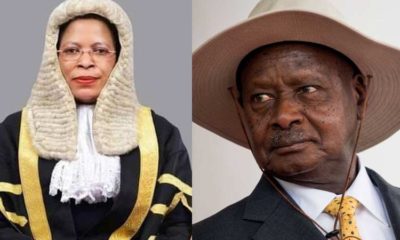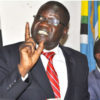Analysis
Parents beware; Bogus bursaries on the rise
A number of people are creating phony bursary schemes to cheat parents
Susan Najjemba, pass-port size photographs for her daughter as well as for her for this great offer.
The organisation claimed it would pay part of the tuition that was as high as Ushs 400,000 in a wide range of schools but it did not show the other costs Najjemba and hundreds of her excited fellow parents were facing the moment they received the bursary.
Najjemba was told she would pay ‘only’ Ushs 100,000 towards tuition and a ‘few other costs as requirements.’
Thanks to her inquisitive self, when Najjemba tried to find out the fees structure of one of the schools she had been shown, she discovered that students on bursary face a cocktail of other charges that totalled or neared the full tuition amount paid by ordinary students.
Najjemba is not alone. In fact she is one of the many victims of the many mushrooming bogus bursary-awarding schemes that have sprouted in recent years to take advantage of people’s plight or sheer desire to get free education.
As parents contemplate the start of yet another schooling year, many are considering the option of trying the growing number of bursary schemes that are being promoted in the media and other communication platforms countrywide.
However, an investigation by The Sunrise has revealed that very few of those schemes are actually genuine. This paper has discovered that a growing number of crooks are taking advantage of people’s plight and have crafted bogus bursary schemes with the sole aim of cheating unsuspecting poor parents.
Most of the fake bursary schemes are so-called ‘half bursaries’ that are created by private individuals usually linked with media outlets and their creators speak philanthropy to parents while on the other hand speak business to private school owners.
Isa Senkumba, one of the proprietors of London High School in Kabowa, Kampala says he has been approached on several occasions by presenters of radio stations requesting for bursaries.
“Some of these people – ‘bursary’ promoters – usually strike a deal with us. They usually ask us how much we charge as tuition. After discovering, they urge us to print fliers with higher fees. When they approach parents, they claim that they are paying half of that money and the parent pays the rest. In actual sense however, the money the parent pay is the exact amount that the schools charge,”says Senkumba.
Alternatively, Senkumba adds, the bursary promoters urge school administrators to waive tuition, but instead exaggerate ‘requirements’ which altogether adds up to the same amount of money the school charges.
“Some of these people are politicians and want to build political capital out of bursaries. Right now we have cases of students from Mbarara who were brought to us by a group of youth. But we discovered that the parents of these students pay Ushs 100,000 more than our fees, which means that the youth use it as a scheme to make money.”
Senkumba places blame squarely on the shoulders of the parents who are eager to get free things or those who are not eager to approach the schools said to offer the bursaries.
“My advice to parents is not to trust very much people who come with offers. I usually tell such parents that if a government like ours which collects taxes has failed to pay fees for UPE students, how do you expect an individual to pay hundreds of thousands of shilling in multiple schools,”
Senkumba adds: “Some parents prefer to stay in the comfort of their homes thereby giving an opportunity to crooks to take advantage of their gullibility.”
Driven by competition, it is little wonder that most of the half-bursary schemes being dangled in the airwaves these days are offered by private schools, especially newly established ones that are still desperate to build their student numbers in order to break-even or meet the costs of paying teachers’ salaries and other running costs.
Most disheartening perhaps is the claim made by the creators of the half bursary schemes that their organization meets the remainder of the tuition, yet in actual sense most of those organizations or their founders have no other source of income.
One organisation that calls itself the Uganda Support for Youth and Children Organsation (TUSCO) based in Kibuli-Kampala, is one of the numerous organisations that claims to offer bursary options in an incredible 44 primary schools around the central region. This newspaper suspects that this is one of the organisations that may be duping parents judging by the way it conceals other costs.
TUSCO claims to meet fees of up to Ushs 400,000 in some of the schools but it does not tell unsuspecting parents the whole range of costs they face when her son or daughter finally gets the offer. The Sunrise has discovered that TUSCO charges Ushs 50,000 as registration fees for needy pupils in order to qualify for a bursary.
In a telephone interview with one of the proprietors of TUSCO who declined to reveal her identity, she dismissed the view that her organisation is one of the phony schemes out there to take advantage of parents plight. She also declined to reveal the source of their money but advised the reporter to get the full details in their office.
Another school, which is a member of a prestigious chain of schools located along Kampala-Masaka road also claims to offer bursaries worth Ushs 450,000. Surprisingly however, the school demands that parents pay an extra Ushs 300,000 including Ushs120, 000/ as medical fees, Ushs 20,000 for sports, Ushs 65,000 as development charges, one bag of cement and Ushs 90,000 for a uniform.
How do the bursary creators benefit?
You probably guessed it. Many bursary-awarding organisations charge registration fees ranging from Ushs 10,000 to Ushs 50,000 per student. Some of them have gone ahead to register with the NGO board with the view to sourcing educational support from overseas.
There are numerous dangers that come with the bogus schemes.
Weak schools
Not only are the majority of the bursaries commonest in new and ill-equipped schools, most of those schools lack basic requirements to operate according to minimum basic standards set by the Ministry of Education and the Police.
Parents are sometimes overtaken by excitement of a big-bursary and do not bother to check perhaps the equally important aspects of their children’s welfare or even the schools legal status.
Jonathan Ssekajja, for example, was offered a half bursary in one school in Mpenja Gomba district. He revealed to this reporter that their school (name withheld) had one biology teacher for the the entire school who used to attend twice in a week.
“We had less than ten test tubes and our biology teacher could only attend twice in a week,” Ssekajja recalls.
Parents will discover for example that most of the schools that offer outrageously attractive bursaries, have no UNEB examination centre numbers, most lack the minimum dormitory safety requirements as set by the Uganda police force.
It is important to note still that a number of new schools or established ones that want to start branches in other outlying areas, tend to take the beneficiaries to these schools.
For example, while a parent might be excited that their son or daughter has received a half-bursary from Kampala University, they may discover rather lately that the beneficiaries are sent to the university’s Luwero campus.
As parents pursue freebies or bursaries, they also face the danger of missing out on good schools whose charges are within reach. Many usually get dismayed when they discover that they have missed out on good schools while they pursue the bursaries.
Children face abuse
Some uncouth school leaders and teachers have abused students who are desperate to keep the bursaries.
A recent report from Mityana revealed how one headteacher lured an under age girl of 16 into sex under the pretext of helping her retain her bursary despite her poor performance. The young girl had obtained a bursary on grounds that she had to perform well short of which she risked losing the offer.
In the same money many of bursary schools have bizarre tendencies like students of same sex sharing dormitories.
It’s absurd that even weird facilities are the order of the day like computer laboratories with just one computer or sometimes none
Uncertified programmes
There is a worrying tendance by higher institutions of learning such as Universities and Colleges that are luring students with bursaries on programmes (read courses) which have not been recognised by the Uganda National Council of Higher Education (UNCHE).
The Sunrise has reliably learned that one private university located along Ggaba road recently graduated hundreds of students on programmes that had not been accredited by UNCHE.
Indeed many students are spending time and money in many universities in the country but face the danger of having their documents rejected on grounds that their degrees and certificates were irregularly awarded.
Caveat
Not all bursaries are fake though. A number of well-meaning institutions with solid foundations such as Kabaka’s Education Trust have solid foundations or are genuinely backed by deep pocketed foreign-based donors.
Comments



















